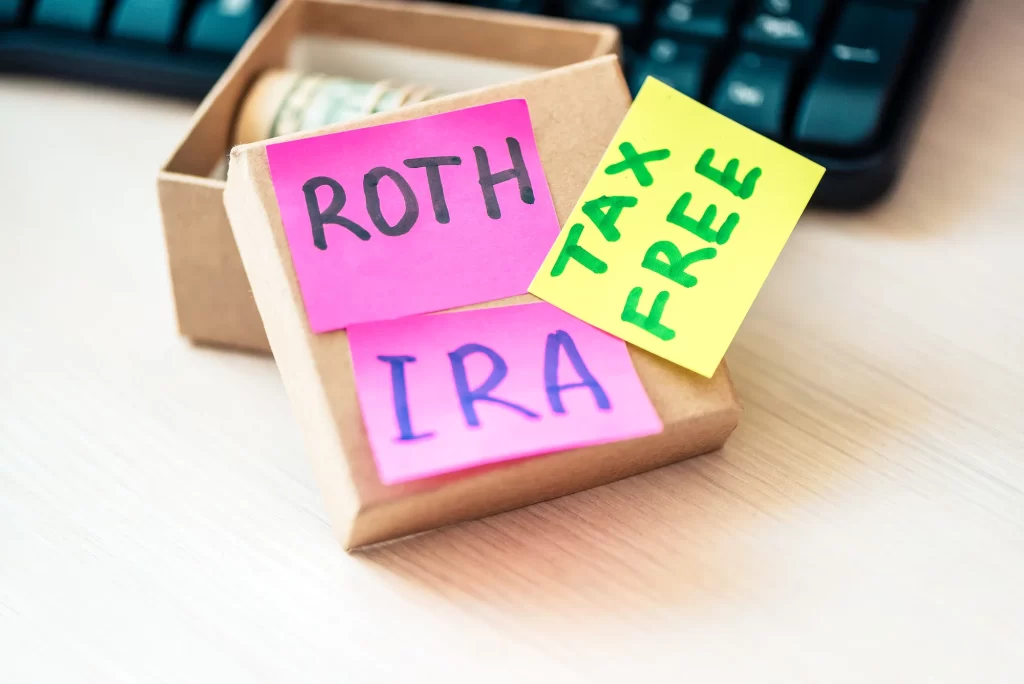
A Roth IRA is a great tool for simplifying and saving on taxes in retirement.
Taxes in retirement can become complicated fast with income coming from several sources. A Roth IRA can help simplify your taxes while offering incredible savings.
Almost every retiree can benefit from a Roth IRA. Opening up an account sooner rather than later can help you position your finances to keep your tax bill low in retirement. Here’s how a Roth IRA can help stretch your retirement dollars further by reducing your taxes.
Roth IRA basics
There are two types of IRAs: traditional and Roth.
Both accounts allow you to contribute up to $6,500 per year ($7,500 if you’re 50 or older), and both allow your investments to grow tax-deferred. The benefits are nice, but the IRS requires you to hold funds in your account until age 59 1/2 if you want to avoid paying a penalty.
There are some important differences for investors to note between a traditional and Roth account.
First is when you pay taxes. With a traditional IRA, you’ll receive a tax deduction equal to your contribution in the year you make it. A Roth IRA requires you to pay taxes on your contributions.
However, you won’t pay taxes on any distributions from your Roth account. In fact, Roth IRA distributions have no impact on your adjusted gross income, which can be very important in retirement. Traditional IRA distributions are considered regular income, so you’ll pay taxes when you take your money out.
Another important difference is that a traditional IRA requires minimum distributions starting the year you turn 73. You never have to take money out of a Roth IRA if you don’t want to.
Both of those distinctions make a Roth IRA a very powerful tool for saving money on taxes in retirement.
Better control over your tax bill
It’s important to note that I’m not advocating necessarily putting all of your savings into a Roth IRA in order to save money on taxes in retirement. In fact, many people will save a lot more on taxes by utilizing a traditional IRA if they’re eligible for a deduction.
But you can use a Roth IRA to decide exactly when you want to pay taxes on your money.
You may benefit from Roth IRA conversions early on in your retirement to lower your overall tax liability over your lifetime. Any amount you convert from a traditional IRA to a Roth IRA is taxable. But you might not have much other taxable income early in retirement.
If you delay Social Security and limit your capital gains income early in retirement, you can convert up to the standard deduction from your traditional IRA to your Roth IRA and pay $0 in taxes on the conversion. Or you could lock in a sub-10% effective tax rate on an even bigger conversion.
Roth IRA conversions early in retirement have the added benefit of reducing your required minimum distributions (RMDs). RMDs are calculated based on the amount held in your traditional IRA. Getting money out at lower tax rates reduces the amount you’re forced to take out later, potentially at higher tax rates.
Reducing taxes on Social Security and capital gains
Roth IRA distributions don’t count toward your adjusted gross income, which dramatically impacts how much you pay on taxes for Social Security and capital gains.
Social Security taxes are based on a number called “combined income.” Combined income is the sum of your adjusted gross income, any nontaxable interest income received, and one-half of your Social Security benefits. If your combined income exceeds a certain threshold, you’ll end up having to pay taxes on a portion of your Social Security benefits.
Since Roth IRA distributions don’t count toward your combined income, it can keep more of your Social Security income tax-free. Conversely, withdrawing an extra $1 from a traditional IRA when your combined income is at the threshold for taxation can result in you paying an effective marginal tax rate substantially higher than the standard tax rates. This is a phenomenon known as the “tax torpedo.” A Roth IRA helps avoid that big pitfall.
Likewise, capital gains on security sales (a major source of retirement income for many) benefit from preferred tax rates. In fact, you can pay as little as 0% on capital gains, but only if you keep your total adjusted gross income below a certain threshold.
Again, distributions from a traditional IRA could push you over that threshold. As a result, not only would you have to pay taxes on the withdrawal, you’ll be pushed from a 0% tax rate to a 15% tax rate on the same amount in capital gains. Effectively, you’ll be paying a marginal tax rate 15 percentage points higher than expected. If you combine that with extra taxes on your Social Security discussed above, you could be facing a huge effective marginal tax rate on traditional IRA withdrawals.
Roth IRAs keep things simple
Perhaps the biggest benefit of a Roth IRA in retirement is that it keeps your taxes incredibly simple. As mentioned at the start of the article, taxes in retirement are already extremely complex. The impact on your taxes from a Roth IRA distribution is just one less thing to worry about.